What is the Return on Investment of Search Engine Optimization?
Placing your products or services in front of the right person at the very moment they have purchasing intent for a product like yours is like striking gold. Most marketing strategies include layered funnels integrated with paid advertising, organic social media, and content marketing. These integrated strategies have the goal of identifying the desired target market, approaching them cold, and then meticulously nourishing them into a warm lead who may, eventually, have buying intent. Those strategies, although proven effective, take time and money, as well as a lot of management with many moving parts.
First, you have to do the job of telling these potential clients that they have a problem, then you must convince them that they need a solution, and then persuade them in the direction of your solution. Of the many ways you can invest in marketing your services, there are few that put you directly in front of your desired demographic right at the moment they need your specific services. Search Engine Optimization, or SEO, does precisely that.
But First… What is SEO?
If you have ever googled something, you have encountered the results of hard-working search engine optimization. At the top of the results page on a search engine like Google, you will see PPC (pay per click) results. PPC results are paid for through google advertisements. Anything below those paid results is considered an organic listing. The results at the top of the organic listings have successfully enhanced their web content through SEO.
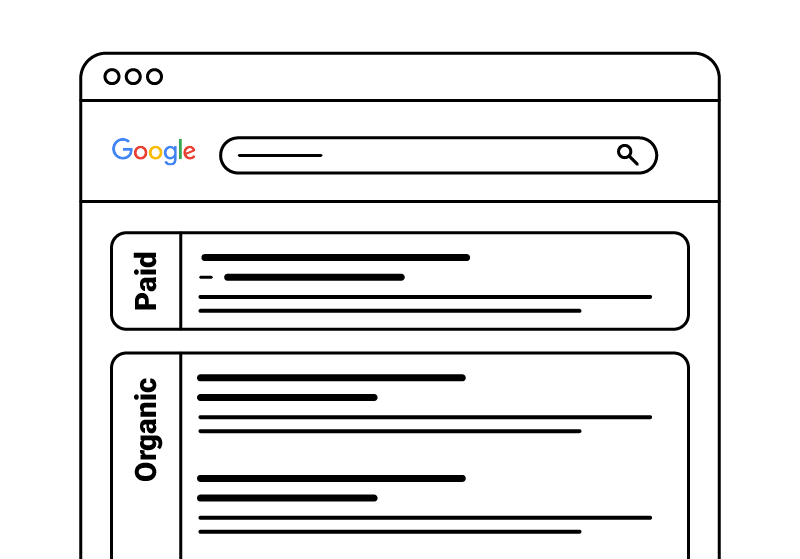
To fully grasp what SEO is, it helps to understand how search engines work. Search engines like Google and Bing are highly complex systems that use proprietary (and highly-guarded) algorithms to crawl and display websites. In fact, it’s estimated that Google changes its search algorithm around 500–600 times every year. Some of these changes are minor, but some are major and can have a significant impact on search results.
A quick breakdown of how search engines work:
- Crawl – First, search engines use software programs to crawl the world-wide-web (www) using a technology called “spiders” or “bots.” These speedy little creatures scan the internet for information from all public websites and then return that information to the central search engine hub.
- Index – Second, search engines take all of the information from the spiders/bots and perform “indexing”- meaning they aggregate all of the content and insert it into their algorithm.
- Display – Third, search engines prioritize the search results based on their algorithm relevant to the search term entered by the user. The results are then displayed to users through a website or application interface (think google.com).
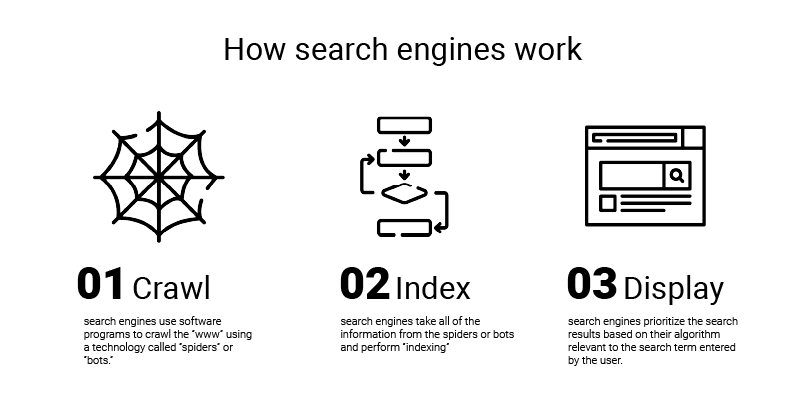
SEO involves optimizing your web content so that, first, it is easier for search engines to crawl, index and display. But more importantly, through SEO, we are helping Google understand the relevance of your content given the search phrase and the authority within the marketplace compared to competitors. The more relevance and authority you can communicate, the more Google will understand and begin showing your web content to searchers over other competitors.
The web content that most efficiently allows search engines to do these things rank higher on the organic search engine results pages (SERPs). There are many different ways to approach optimizing your website for search engines. Everyone has their own unique process which they are always tweaking and improving. However, there is a foundational process that most experts utilize:
- Research – Research primary keywords for buying intent, volume, and competitiveness. Utilize various research tools, analytics, and competitor analysis to develop a plan.
- Structure – Create a plan for structuring keywords on website pages to maintain the right amount of keyword density.
- On-Site – Optimize website pages for specific keywords. Utilize a variety of on-site optimization techniques to help search engines crawl your website pages and find relevant keywords and content.
- Link Building – Research, build and submit links to off-site websites that will help make your own website ranking authority.
- Improvement – Monitor search engine crawling and ranking. Make adjustments to improve the keyword ranking strategy to both on-site and off-site tactics.
- Analyze – Analyze search engine ranking results, make long-tail adjustments, and prepare to report (where necessary)
Why SEO Matters
Not only does SEO bring more traffic to your website, but it also brings the right traffic to your website at the precise moment they are in need of your services. Beyond the statistics, I am about to share regarding the number and type of consumers you have the ability to get yourself in front of, landing on the top 5 listings of a search engine like Google provides you with perceived credibility as an expert in your area. This perceived value only enhances your chances of landing a warm lead.
How SEO Brings More Traffic
Search is the number one driver of traffic to websites, outshining social media by over 300%. 93% of online experiences begin with a search engine. In fact, in one second, there are over 78,000 google searches of people trying to find an answer to the problems they are facing. The reality is that an overwhelming percentage of consumers, who might be in your desired target audience, spend time on search engines asking questions you have answers to.
How SEO Brings the Right Traffic
81% of people perform some type of online research before they make a purchase decision. These searchers have identified their problem and the solution they need to fix that problem and are now using key phrases and keywords to find the best solution for them. For example, before you found this article you may have searched “What is the ROI of SEO” because you are considering implementing SEO into your marketing strategy, but not sure if it is worth it (hint: it is).
Getting in front of these people, who have already migrated through the majority of the consumer journey, who know what they are looking for, and who are ready to make a purchasing decision is the goal of any marketing strategy. 75% of these people never scroll past the first page of the search engine results page, and in fact, the top 5 results on Google account for 67% of total clicks. Optimizing your content to rank on the first page of a search engine results page through SEO puts you in front of red hot leads ready to click on your content, and to not attempt to optimize your content to get in front of these people would be a huge loss in potential leads and sales.
SEO Vs. PPC
You may think that if getting on the front page of a search engine is the answer to your problem of traffic to your website, then why not just pay to show up as an advertisement on the very top of the results page? When looking at SEO vs PPC statistics, research shows that 70-80% of users ignore the paid ads completely, focusing their attention (and clicks) on the organic listings. These listings, of course, ranked on the front page as a result of proper search engine optimization.
How Do You Measure SEO Success?
So we know that there is an abundance of traffic on search engines and that if you are optimizing your web content to be on the top 5 listings of a search engine results page, you are likely going to be in front of warmed up leads ready to take the next step in the customer acquisition journey. But, you are probably asking yourself the important questions: What does it take to get there? How much does SEO cost, and is it a profitable investment? If so, how long until I see a return? All in all – What is the ROI of SEO?
How much does SEO cost?
First, it is important to mention that there is traditional SEO, which seeks to optimize your web content on a national level, and local SEO, which optimizes your content on a local level. Local SEO allows organizations to capture potential consumers in their direct market and is often used by small businesses that have a physical presence in their city. Stores with a desire to bring in more local traffic to their website and physical location might invest in local SEO.
A business should be prepared to spend at least $500/month for local SEO if they want to see profitable results. On the other (and much larger) hand, traditional SEO optimizes nationally. Ranking on a national level takes a lot more time, and subsequently money, but can result in a much larger sum of sales. Organizations hoping to optimize their web content nationally should be prepared to spend upwards of $5,000 a month. Understanding average SEO costs, is it worth your investment?
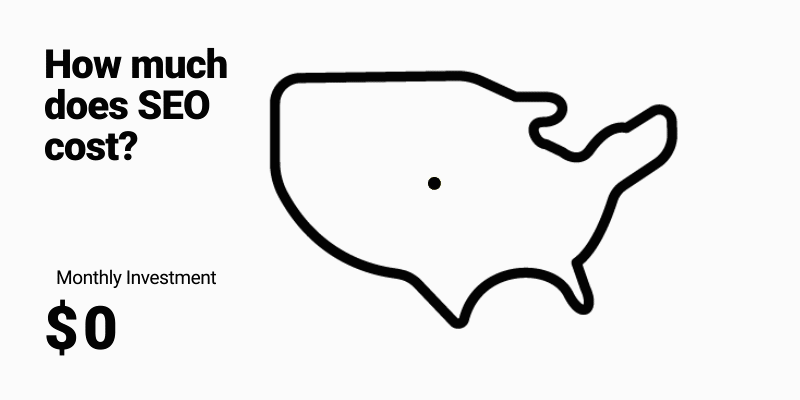
What is the Return on Investment of SEO?
Does SEO actually increase sales? Is SEO business profitable? If so, how long does it take to see results? In short, yes, it is well worth your money, although it does take some time to see the needle move. Understanding the return on investment for SEO is not so black and white, but defining the ROI of SEO is imperative in answering those questions.
First, what isn’t SEO ROI? Although we measure the success of SEO through multiple KPIs, the largest one being SERP rankings, ROI should not be confused with statistics like the number of links built, keyword rankings, or raw organic traffic to your website. On a foundational level, the return on investment of search engine optimization is like any other calculation of return: What did I spend and how much did I make from that expense? In fact, when discussing ROI, it is always in terms of dollars returned. It is the revenue generated from the keywords you now rank in.
How Do You Calculate the ROI of SEO?
The challenge with calculating the ROI of SEO is that SEO is a long-term strategy, which takes time to rank and then start producing revenue. If you want a true picture of the return on your SEO investment, it is important to look at the revenue and traffic generated over a time span of two to three years. Additionally, improvements in SEO not only increase traffic, and ultimately revenue, but they enhance your brand image with perceived trust. This generates loyalty, which in turn results in repeat purchases. So, we have to consider the lifetime value of a customer that was generated from SEO.
The foundation calculation for ROI is Revenue from investment minus (-) cost of investment, divided by (/) cost of investment.
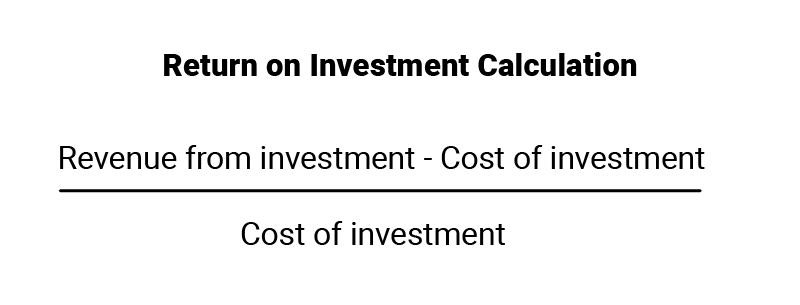
When calculating the ROI of SEO, it greatly depends on the client. With e-commerce clients, the numbers are there to tell you how much you have spent and how much you have made. There isn’t much estimation or speculating. However, with a non-e-commerce client, like in the service industry, it isn’t so clear-cut.
Accurate calculating the ROI of SEO involves understanding a few important metrics and formulas.
Step 1: The first step in calculating your SEO ROI is finding out your average click-through rate by ranking.
-
- Understanding this will help you in your ROI measurement for keywords ranking at different levels on the page. To do this, you can analyze data in the Google Search Console.
- You can also utilize other resources like this to define CTR by ranking.
Step 2: Identify the conversion rates for the goals you have.
-
- Based on historical data from Google Analytics, define the conversion rate for each conversion goal you have, from email subscriptions to sales.
Step 3: Define the value in dollars of each conversion goal.
-
- For each of these conversion goals, what is the value of each one in dollars? Defining the value in dollars of a form fill might be more difficult, but for the sake of ROI estimation, give it your best guess.
Step 4: Estimate your traffic and revenue based on search volume.
-
- ((Total estimated traffic * Click Through Rate) * Conversion Rate)) * Goal Value($) = Estimated SEO Revenue per Month
Step 5: Calculate the estimated ROI.
-
- (Estimated SEO Revenue per Month – Cost to Implement Strategy) / Cost to Implement Strategy * 100 = SEO ROI
How Long it Takes to See ROI from SEO
So now you know how to calculate the ROI of SEO, but when will you start to see that ROI? If you are in a hurry to get your product or service in front of the multitudes, SEO isn’t going to help you with your immediate needs. The long-term benefits of a tactical SEO strategy, however, will last a very long time. To get to your question, it can take anywhere from 6-12 months to start seeing results. However, that number varies based on a series of factors, including how your current website traffic is flowing: if it has a strong flow of traffic already, it can take less than six months to start ranking on the first page.
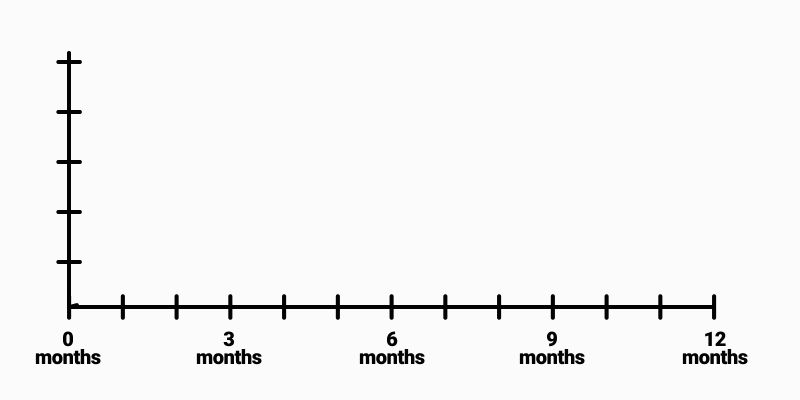
Remember though, ranking on the front page does not necessarily mean ROI, and seeing the most substantial returns on your SEO investment could take years. This is certainly a long-term commitment, and the longer you stay consistent with your web content optimization, the higher your rate of return will be down the road. That isn’t to say that your traffic won’t start to heavily increase, which will likely result in increased revenue generated from your organic traffic.
Getting to the top five organic listings on a search engine results page is certainly the outstanding goal; However, once you start your SEO journey, you will begin to notice movement. Moving up from #62 to #38 on high-priority keywords indicates that Google is starting to understand your website is easy to navigate and is useful relative to your competitors also trying to rank.
Does SEO increase sales?
Typically yes, but it depends on a variety of important factors. Have you properly identified your target market? Do you know the keywords you want to rank for? For those keywords, have you built up a sufficient amount of authority? Are you properly putting in the content so Google understands the context? If the answer is yes to all of these, then absolutely, SEO does increase sales, and greatly outshines most other marketing efforts in that arena.
How much does SEO outperform other marketing efforts?
Inbound SEO leads are 8.5 times more likely to become a paying customer than any leads coming from outbound marketing efforts.
How Does the ROI of SEO Compare to Paid Search ROI?
The fact is, if you run PPC advertisements on a search engine like Google, you will appear on the first page. Comparing PPC and SEO, however, is like comparing apples to oranges. Although they both have the same goal and result of getting you in front of your desired target market, they accomplish those goals in very different ways and for different reasons. It isn’t that PPC ads are ineffective. Running a PPC campaign will get you in front of the people you need to get in front of, and in a hurry.
There are certain products, services, and scenarios, where timing is everything, and the only viable option to accomplish your goal is running an ad. That is just it though: PPC is a very short-term game. You receive the instant gratification of exposure to a warm audience, but it provides no long-term advantage. With PPC advertisements, as long as you are spilling money into the ads machine, you will attain your desired exposure. Once the money stops, though, you immediately lose your ranking, exposure, and traffic. Speaking of money, the ads have a hefty cost per click, a minimal click-through rate, and the conversion rate is much lower.
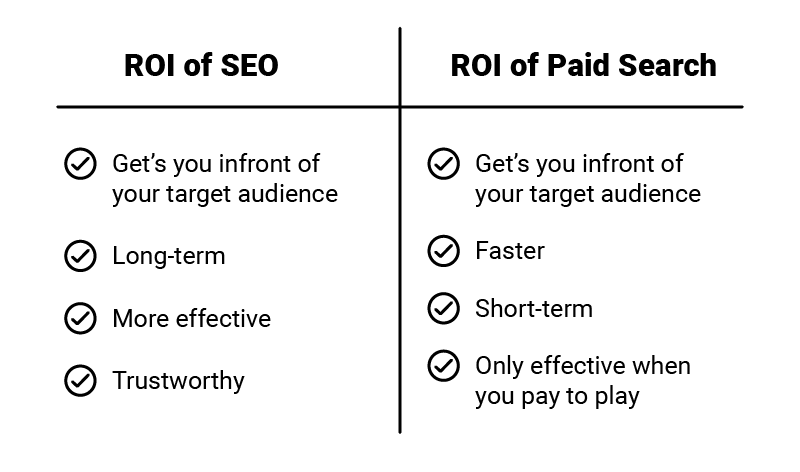
On the other hand, SEO also gives you the traffic and exposure to a targeted demographic, but it is a long-term investment. As we have indicated, enhancing your web content to rank on page one can take anywhere from 6 months to a year. Once you are there, though, the rankings and traffic do not disappear. As far as effectiveness compared to PPC advertisements, studies have shown that 70-80% of searchers scroll straight past the advertisements directly to the organic listings. Organic listings transcend the barrier that ads can never fully climb over or tear down – trust.
Showing up as an organic listing on the first page of Google provides you with the perception as an expert in your industry, and as we know, people who are searching on the internet are looking for a solution to a problem, and who wants to go to someone they don’t trust when facing a problem. Research confirms that over 71% of searches resulted in a page 1 Google organic click. In fact, organic listings outperform paid search results by 94% in terms of clicks. For every one click on a paid search result, the organic results generate 8.5 clicks. Organic rankings always equate to higher quality traffic that is much easily converted to a lead or sale.
Why Partner with Sproutbox?
Search Engine Optimization (SEO) is one of the most effective marketing tools when it comes to lead generation. It enables businesses to rank their website higher than their competitors in search engines like Google and Bing. When you increase your organic ranking, you increase targeted website traffic which enables you to increase your leads.
When you partner with Sproutbox for your SEO efforts you will receive and have access to:
- Higher Quality Leads
- Proven SEO Experts
- A Google Certified Partner
- A proven, High-Level Strategy that will pay dividends in the long-term.
Schedule a Free SEO Consultation
References:
- https://optinmonster.com/seo-statistics/
- https://www.monsterinsights.com/seo-statistics.
- https://junto.digital/blog/seo-stats/
- https://99firms.com/blog/search-engine-statistics/
- https://neilpatel.com/what-is-seo/
- https://robbenmedia.com/seo-roi/
- https://terakeet.com/blog/seo-roi/
- https://www.webfx.com/blog/seo/seo-vs-local/
- https://www.searchenginejournal.com/seo-cost-calculator/264305/
- https://www.zerolimitweb.com/organic-vs-ppc-2021-ctr-results-best-practices/
- https://www.seerinteractive.com/blog/how-to-calculate-roi/
- https://www.business2community.com/seo/organic-click-through-rates-by-position-and-percent-2020-02305348
